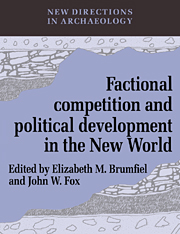1 - Factional competition and political development in the New World: an introduction
Published online by Cambridge University Press: 18 December 2009
Summary
This volume calls attention to the importance of factional competition as a force of social transformation. It argues that factional competition is implicated in developments as diverse as the spread of ceramic technology and maize agriculture, the origins of permanently instituted leadership offices, the expansion and collapse of states, and the European domination of indigenous New World peoples. Although this volume focuses upon the New World, its perspective is relevant to the social histories of other areas of the world as well, because all non-egalitarian societies, both ancient and modern, are shaped by the dynamics of factional competition. Bringing an agent-centered perspective to the study of political development, this volume also contributes to a general understanding of social stability and change. An agent-centered perspective maximizes the amount of data drawn into the analysis and thus permits the most detailed and complete account of specific cases of political continuity and transformation.
Our studies of factional competition both complement and critique the two prevailing approaches to prehistoric social change: cultural ecology and Marxism. Cultural ecology focuses upon the dynamic interactions of human populations and their local environments. As a complement to this, the studies in this volume examine the internal dynamics of local populations, dynamics that help to shape the strategy of resource exploitation. Marxist theory focuses upon the dynamics of class struggle: a model postulating solidarity within classes and struggle between them. As a complement to class struggle, the essays in this volume emphasize the importance of conflicts within classes and alliances between them.
- Type
- Chapter
- Information
- Publisher: Cambridge University PressPrint publication year: 1994
- 62
- Cited by



